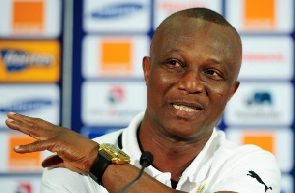Accra, Feb. 8, GNA - Mr. Yaw Osafo-Maafo, Minister of Education and Sports, on Tuesday said the government's new focus and priorities would help accelerate growth and push "Positive Change Chapter Two" forward. He said a three-prong priorities strategy namely, a vigorous human resource development, private sector development and a continued emphasis on good governance would drive all programmes and accelerate the pace of their implementation.
Mr. Osafo-Maafo said these when he was moving a motion on the floor of the House to thank the President, Mr. John Agyekum Kufuor for the message on the State of the Nation Address.
"The whole country should be thankful to the President for bringing the quality of human resource development to the centre stage of the country's priorities," adding, "A vigorous human resource development means education."
"The quality, suitability and the quantum of skill labour is a function of any country's educational system and also the bedrock for its development."
Mr. Osafo-Maafo said countries, which have succeeded in turning their developments around within a couple of generations has done so through an effective and relevant educational system. "What Positive Change Chapter Two seeks to do, is create an enabling environment towards the goal of achieving sustainable development."
"Mr. Speaker, human resource development a greater part of which falls on my shoulder is a vital variable in the development equation," adding that, "A country can have all the necessary material resources for the desired development but without the right human resource, development will be elusive to them."
To buttress the importance of knowledge to development, Mr. Osafo-Maafo quoted a report by the World Bank on world development published in 1999, which said, "Forty years ago, Ghana and the Republic of Korea had virtually the same income per capita. By the early 1990s, Korea's income per capita was six times higher than Ghana's. Some reckon that half of the differences is due to Korea's greater success in acquiring and using knowledge."
Mr. Osafo-Maafo who is also the NPP MP for Akim-Oda said the message on the State of the Nation would make Ghanaians at home and abroad proud and confident.
"We have a good future ahead of us, the right foundations are being laid and it is just a matter of time before Ghana will become a major economic force in Africa."
He therefore called on the House to support him in thanking the President for "his visionary and relevant message to the nation."
Mr. John Mahama, NDC MP for Bole-Bamboi, who seconded the motion, said this year's message from the President was significantly different from the previous ones.
He said this time round the President has shown his maturity by not blaming previous governments for the "woes and problems" of his government and was reconciliatory by calling on all Ghanaians to help build the nation.
"He has stop the blame game and taken control over the situation, that was why there was no heckling from the Minority during the delivery of his speech."
Mr. Mahama however, said the President's address was not exciting and failed to tell the nation "where we are at, where we are going and how we are going to get there."
He said micro-economic stability in itself is not an end to Ghana's economic problems and that what Ghanaians want to see is a steady improvement in the standard and quality of their lifestyles. "We will also like to know what is happening at the macro-level since that is more important for our development."
Mr. Mahama said the cedi's stabilisation against the dollar is not the criteria to be used to judge its performance since it has been falling against other currencies like the Euro and the CFA. On education, Mr. Mahama said it has been pushed to the background and that emphasis is now being placed on human resource development. He said, "extending the number of years and making cosmetic changes in our educational system such as changing the JSS to JHS or SSS to SHS are not the solution to the problems facing it."
"Quality of education, motivation of teachers, expansion of educational infrastructures and closing the gap between the urban and rural schools are some of solutions we should seek."
He said the NPP government has performed abysmally in the area of housing and that they have neglected that sector adding, "every government in our history has shown an interest in housing Ghanaians." Mr. Mahama wondered when a white paper on the National Reconciliation Commission (NRC) and its publication would be made available to the public.
Mr. Kojo Armah, CPP MP for Evalue-Gwira said the President's vision of youth training programmes is very laudable and must be vigorously pursued.
He said the youth has been subjected to radical educational policies and reforms, which are sometimes not properly executed and goes a long way to affect their balance and planning. Mr. Armah said teachers as well as staff of the Ghana Education Service should be motivated to play their roles well or else any reform would not materialise. 08 Feb. 05
Politics of Tuesday, 8 February 2005
Source: GNA
















